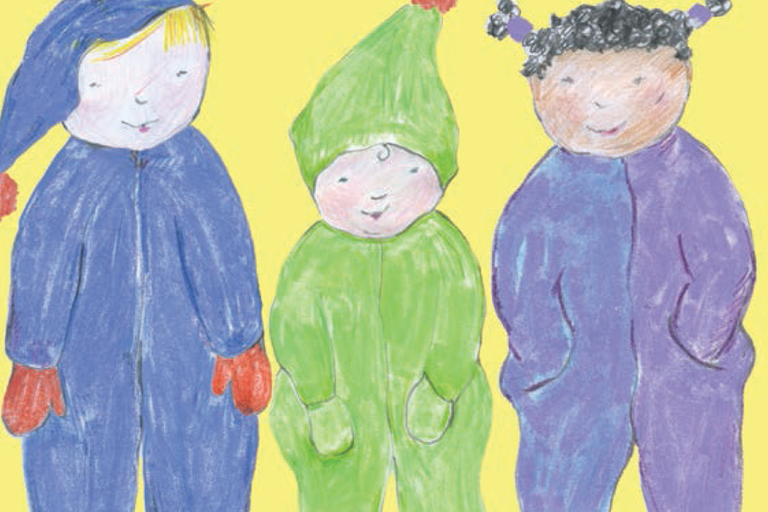Sleep - babies and toddlers
Top ten tips for parents and families
Read them below or download the PDF file here.
Sleep is just as important as food and exercise - we all need to get enough, but it's especially important in the first years of life.
Here's a rough guide to sleeping patterns up to the age of 3.
- Newborn to 3 months: 15 hours; new babies are likely to need 3 naps during the day
- 3 to 6 months: 14½ hours including 2 naps a day
- 6 to 9 months: 14 hours including 2 naps a day
- 9 to 18 months: 13½ hours including 1 to 2 naps a day
- 18 months to 2 years: 13 hours including 1 nap a day
- 3 years: 12 hours may still have short nap or catch up every few days
But what counts as enough varies from one person to the next, and babies and children are just the same. The important thing is that sleeping is in a pattern that suits your baby.
Our tips on helping your baby or toddler get enough sleep are based on information from professionals and parents. All babies are different and you should do what works for you and your baby.
- 1) Stay close
-
For the first six months, your baby should sleep in the same room as you. For safety reasons, you should place your baby on their back, in a cot in the room with you. Do not overheat your baby or expose them to cigarette smoke.
- 2) Treat day and night separately
-
When babies are born they do not know day from night. Over time they learn to sleep more at night and less during the day, so it helps to separate day and night from the start. During the day, open curtains, keep it light and bright, play with your child and don't try to shut out everyday noises when they are asleep. At night, keep lights and noise levels low.
- 3) Try to stick to bedtime and morning routines
-
Babies and children like things to be calm and predictable. You may be able to get them into a bedtime routine quite early on. Try to do the same things in the same order: bath and change for bed; brush teeth; bed; read a story; kiss goodnight and dim the lights. Getting your child up at the same time every morning may help to 'set' their body clock.
- 4) Quiet time before bedtime
-
Let your child know when bedtime is coming up. Remember, your child may not seem sleepy - being hyperactive and irritable can mean they're tired too. Have some quiet time before bedtime, for example looking at books, singing or playing a quiet game. A bath is good for relaxing them. After the bath, it can help to go straight to the bedroom.
- 5) Help your child to learn to settle themselves
-
Sometimes it's difficult to get to sleep - this is as true for babies as it is for adults. At first, babies may go to sleep being rocked or fed. However, babies will develop their own sleeping patterns and will start to sleep for longer over time. It is important that bedtime is not a battle; your baby needs to feel safe, secure and comfortable to get to sleep on their own.
- 6) Stimulation
-
Lights from the TV and other screens affect the hormone which brings on sleep (melatonin). Playing with iPads, mobile phones or other backlit devices will keep children awake. So it helps to switch off the TV, computer or other screens in the hour before bedtime.
- 7) Settle your child down to sleep
-
Read or sing to your child in bed to help them settle, then say goodnight. Dim or turn off the light and let your child settle themselves. When you leave the room your child may cry. Go back and talk to them quietly, comfort them - they may just need a cuddle. Put them back to bed and leave them to settle by themselves.
- 8) During the night
-
Some babies may sleep through the night at 6 months while others will still wake up, all babies are different. If they cry while they're settling or wake up at night keep things low key. Comfort any distress. Limit doing anything that will keep them interested and awake. If your child gets out of bed, calmly take them straight back to bed with no discussion.
- 9) Try a sleep diary
-
If you are having difficulty getting your child to sleep it may be useful to keep a sleep diary. But remember, there is a big difference in the sleeping patterns of babies under 6 months and older children. Try not to focus on the lack of sleep and have realistic expectations. Babies are all different, but generally will sleep better if they feel safe, secure and comfortable.
- 10) Look after yourself
-
Remember, all parents and carers will have some interrupted sleep when their children are young. Get a break if you can - if your child has a nap, take the chance to have a rest. Easy to say, hard to do! Do not be afraid to ask for help from family and friends. If you are worried or need extra advice, talk to your health visitor.

